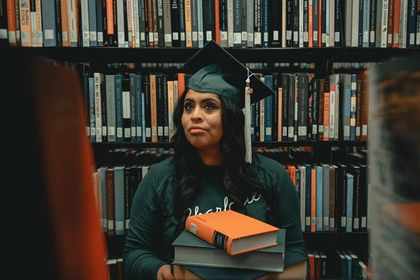Books to read before university
Going to university for the first time can be one of the most nerve-wracking and exciting times of your life. Any information about this scary new step often comes from other people’s wild university tales, or helpful hints on the internet. Therefore it can be reassuring to turn to fiction as a way to learn more about the place you will be spending the most formative years of your life. But is delving into university-based novels really that helpful for an incoming fresher? Or could it potentially make them even more wary?
One book that definitely falls into the category of portraying university as less than ‘the best time of your life’ is Donna Tartt’s classic The Secret History. Based within the elegant fictional Hampden College, it represents university as a place only for the privileged, where intellect and style is placed higher than any other personal quality. The protagonist Richard Papen strives to become part of an elite and mysterious group of students who hold themselves higher than the rest of the student body. But it’s this wish to leave what he sees as his shameful working class roots that plunges him into a murder investigation, showing the pitfalls of trying to develop a false personality for yourself at university. Reading this book before university makes us aware that a privileged upbringing can create prejudice, and is definitely not the most hopeful representation of higher education to read as a fresher!
It may be nice for an incoming fresher to know that rather than your degree being an isolated three years of learning, it will affect the rest of your life in ways you might not expect
However, there are many other books that steer clear away from this portrayal of dark academia and isolation to show what a great opportunity university can turn out to be. David Nicholls’ love story One Day starts on the night of graduation at Edinburgh University for polar opposites Dexter and Emma. Both reflect on their time at university and their futures to come. Little do they know in that moment, but the friends they have made at university will reappear again and again throughout the novel, showing how long-lasting and important these friendships can be.
Additionally, what Emma and Dexter believe to be a graduation one-night stand becomes the start of their incredible love story. Whilst this does give some scary weight to the idea that you will find your future spouse at university, it also highlights the growth you can do within this time. It may be nice for an incoming fresher to know that rather than your degree being an isolated three years of learning, it will affect the rest of your life in ways you might not expect.
The vast array of depictions of university life in fiction echo the real life experiences: everyone’s is different
The book that I think is potentially the most useful for incoming freshers to read, and one I myself read just before starting at Warwick, is Sally Rooney’s Normal People. The novel displays how traits which may make you ‘geeky’ and unpopular at school are the sort of unique things that allow people to make such an array of interesting friends at university. Likewise, being good-looking and sporty might be enough to shoot you into being the most popular person at school, but at university people seem to look more for genuine rather than surface-level attributes.
Most importantly, Normal People is a great novel to read before university because it shows this time can be whatever experience you wish it to be, and your set of friends and activities can be a world away from the boring routine of home. Also, the recent TV adaptation has been hugely popular, showing how Rooney’s material is resonating with so many people and taking them back to the nostalgia surrounding this time in your life.
The vast array of depictions of university life in fiction echo the real life experiences: everyone’s is different. While reading about a new experience in fiction before actually living it can be reassuring, they can be far from what we actually encounter. Just as asking our parents and friends about university can be fun, there is also not much point in taking these opinions as gospel. University is whatever we make it, so no one else’s interpretation will ever be quite as accurate as our own.

Comments
Comments are closed here.